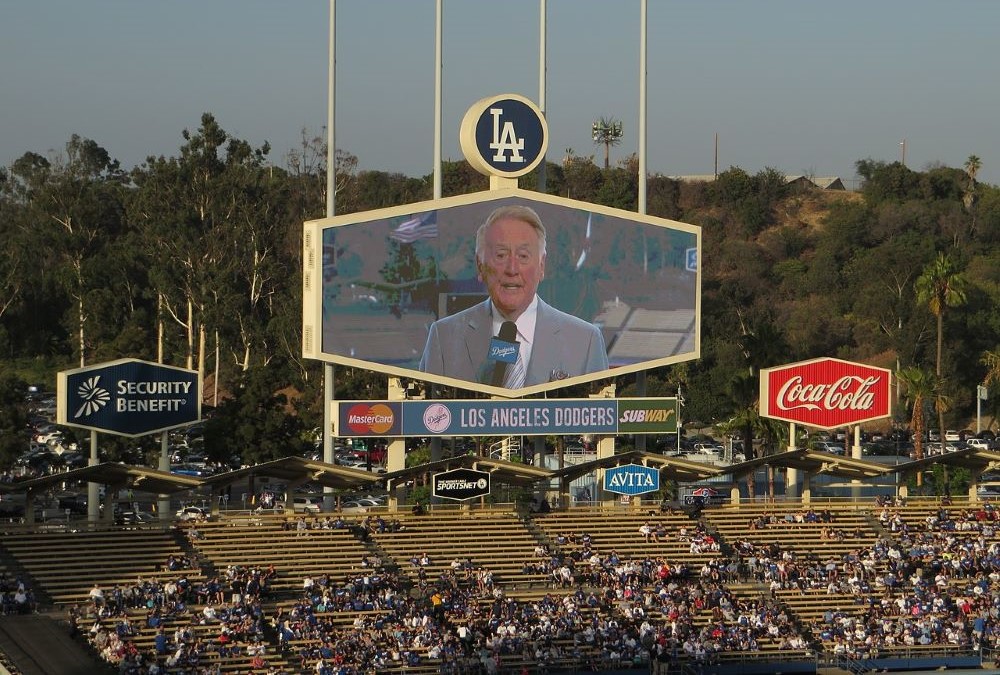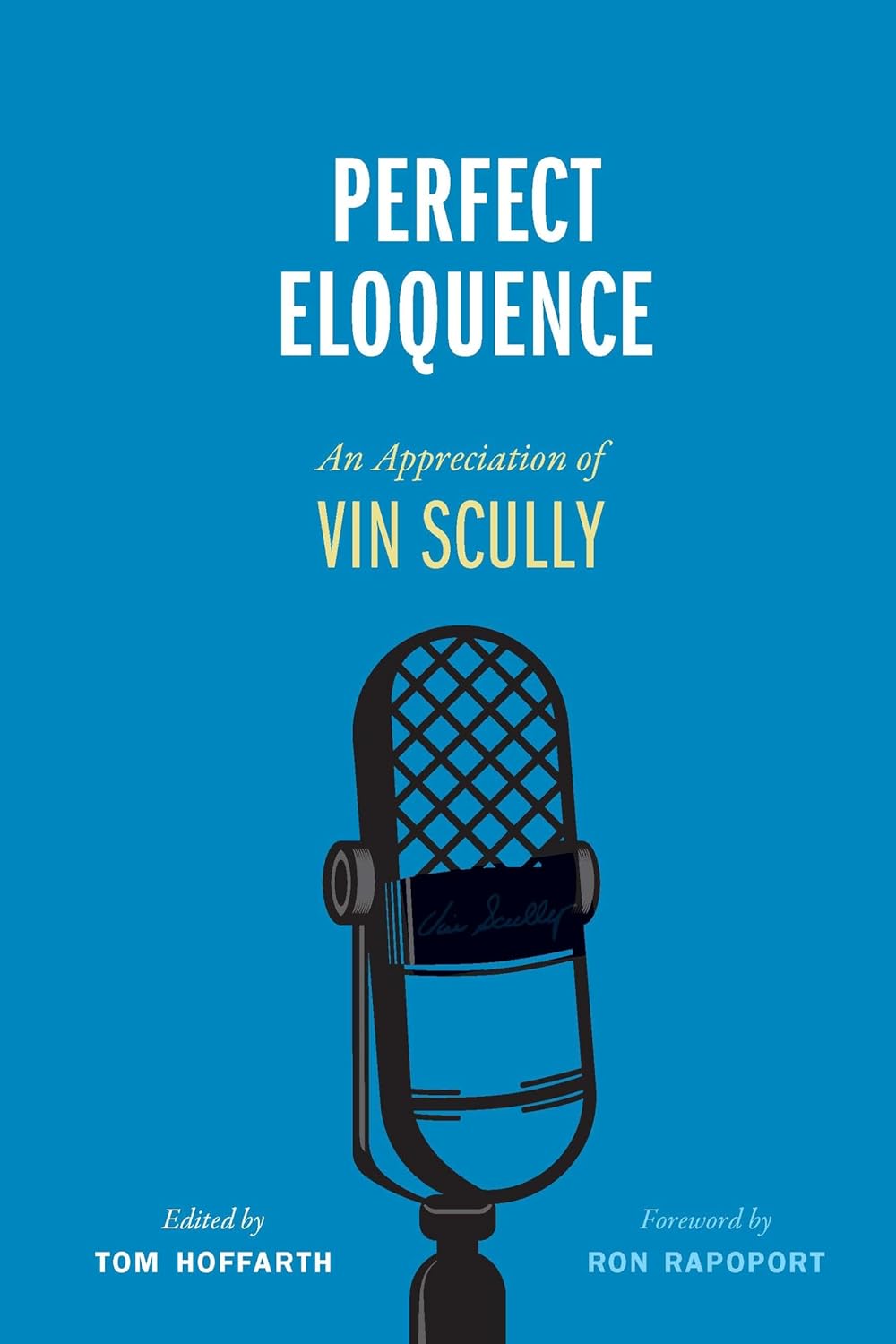
Longtime LA Dodgers announcer Vin Scully appears on a screen June 26, 2014, as the Dodgers took on the St. Louis Cardinals at Dodger Stadium. Scully is the focus of "Perfect Eloquence," a new collection of essays. (Wikimedia Commons/CC-BY-SA-2.0/Ken Lund)
It’s no accident that the greatest practitioner of one of America's most treasured secular liturgies was a faithful Catholic.
For 67 years, from the major league baseball season of 1950 to that of 2016, Vin Scully (1927-2022) broadcast Dodgers baseball games. With the same cadence and seriousness as a pastor greeting parishioners with "The Lord be with you," Scully welcomed listeners with,"It's time for Dodger baseball."

In Perfect Eloquence: An Appreciation of Vin Scully, journalist Tom Hoffarth has assembled an entertaining, detailed and assuming history of Scully's long, charmed life in the form of 67 essays by people who knew him. It's a terrific read for baseball fans; but it's also a deeper document about a faithful man, the cultural art form of radio baseball and 20th century life in the United States.
Scully was a New York kid who grew up in the Bronx and was reared in Washington Heights. After a stint in the Navy, he was educated by the Jesuits at Fordham before studying broadcasting and journalism. The Dodgers, then of Brooklyn, hired him at age 22. When the team moved west to Los Angeles, Scully went with them.
The first radio baseball game was narrated in 1921 by KDKA in Pittsburgh, and the first broadcasts were famously crude. In the 1930s, former president Ronald Reagan broadcast Chicago Cubs games for a station in Iowa by reading ticket tape descriptions of every play and simulating their live action description.
It was in the decades after the war, as Dwight Eisenhower built the interstates and more and more middle and upper class Americans left their cities and towns for suburbs, that baseball boomed on the radio. A country where people lived farther and farther apart needed the technology of radio to bridge distances. The audience exploded. Broadcasters honed their craft.
From the beginning, Scully developed the subtle art of making listeners feel comfortable with consistent routines while at the same time innovating enough to surprise people. He possessed a gift: a capacity for preparing lines for moments of stirring eloquence during the most dramatic moments of baseball games.
"There's 29,000 people in this ballpark and a million butterflies," said Scully during Sandy Koufax's perfect game in 1965.
In 1974, when Hank Aaron broke Babe Ruth's home run record in Atlanta, Scully declared: "A Black man is getting a standing ovation in the Deep South for breaking the record of an all-time baseball idol. What a marvelous moment for Atlanta and the state of Georgia. What a marvelous moment for the country and the world."
It's no accident that the greatest practitioner of one of America's most treasured secular liturgies was a faithful Catholic.
In Game 1 of the 1988 World Series, Scully introduced Kirk Gibson, who was about to hit a game-winning homer against the Oakland A's. "All year long, they looked to him to light the fire and all year long he answered the demands until he was physically unable to start tonight with two bad legs, the bad left hamstring and the swollen right knee," he said. "And with two out, you talk about a roll of the dice, this is it." After the home run: "In a year that has been so improbable," he said, "the impossible has happened."
Scully developed a musicality with its own rhythms. One fan who noticed was the blind musical legend Ray Charles. He once asked broadcaster Bob Costas to introduce him to Scully. Why? "Well, I love baseball," he told Costas. "And you have to understand, Bob, the pictures mean nothing to me. It's all the sound. And Vin Scully's broadcasts are almost musical."
Interestingly, Scully preferred to broadcast games by himself. He treasured the individual connection to listeners. If he owned a team, he said, he "would not want a lot of voices cluttering up the air. I would want one man at one time talking to that fan."
And a lot of us were that fan.
The journalist Paul Vercammen tells the story of being born in California to immigrants from Belgium. "A lot more about English was learned" listening to Scully "than what well-intended teachers wrote on a chalkboard," Vercammen writes in the book.
I was born in Belgium to American parents and learned how to talk and think like an American by listening, awake in bed throughout the European night, to Scully and other baseball announcers rebroadcast on Armed Forces Radio. It's no exaggeration to say that the baseball I heard on the radio changed my life, inspiring my careers as a writer and baseball coach.
In Perfect Eloquence, Scully's friends tell stories of virtue and good habits befitting a saint. When Scully wanted to quit smoking, he replaced his pack of cigarettes with a picture of his family. Instead of lighting up, he looked lovingly at their image. Scully recorded a CD of himself reading the rosary. A copy was sent to Pope Francis, with Francis sending a note thanking Scully and mentioning that the recording had helped him improve his English.
In 1984, Lisa Nehus Saxon, a female sports reporter at a time when there were few, was kicked out of a clubhouse. "What you’re doing is remarkable, Lisa," Scully told her on a bus ride. "Never lose sight of that. Just strive to be the best version of yourself every day." When the Dodgers held a Mass for Scully's last broadcast at Dodger Stadium in 2016, Charlie Culberson hit a walk-off home run to win it.
Scully's niceness could come off as performative from anyone else, but he came by his faith and wisdom through pain and tragedy. His first wife died young of an accidental medical overdose. He lost a 33-year-old son in a helicopter crash.
Scully was a political conservative who gave money to every Republican president except for Donald Trump, and an old-fashioned patriot who used his eloquence to speak up for values he cherished. On D-Day, June 6, he liked to recite an ode to the soldiers who liberated Europe from Hitler. "The boat ramp goes down, you jump, swim, run and crawl to the cliffs," he said in 2015. "Many of the first young men were not yet 20 years old, and they entered the surf carrying 80 pounds of equipment. Many of them drowned. They faced over 200 yards of beach before reaching the first natural features offering any protection at all."
Advertisement
In 2020, during the Black Lives Matter protests, Vercammen interviewed his hero: What would Jackie Robinson make of the unrest?
"I'm not dodging the issue," Scully responded, "but I'll quote somebody who said something that has had a great deal of meaning for me: 'We will remember not the words of our enemies, but the silence of our friends.' So there's a lot of people who are not speaking up or not telling the right things. And I hope eventually, I pray, that eventually everyone would start talking together. And maybe we can work this thing out. God help us if we don't. [Robinson] spoke out; he was not a silent friend."
There was nothing silent about Scully's life, projected to his listeners, his friends, around the world, spreading the gospel of baseball and affirming the beauty and value of storytelling, the English language — and life itself.








